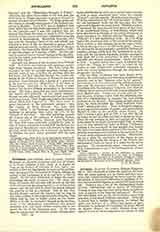

Jovianus, FLAVIUS CLAUDIUS, Roman Emperor, 363-4. After the death of Julian the Apostate (June 26, 363), the army making war on Persia and then in retreat from Assyria proclaimed Jovianus emperor, after the prefect of the guard, Sallustius, a confidant of Julian, had refused the dignity on account of his advanced age. Jovianus was a son of the distinguished Count (Comes) Varronianus and a native of Pannonia. Though at that time less than thirty-three, he held the rank of captain in the imperial bodyguard. His election was hailed with joy by the Christians, since from him they could expect religious toleration. Although Jovianus had a warlike appearance, he lacked the spirit and decision of a soldier and leader of men. Therefore he accepted the conditions of peace offered by Shapàr (Sapor), the crafty Persian king, and agreed to restore the boundaries of the empire as they existed before the peace with Diocletian in 297. The four satrapies east of the Tigris, with the fortified cities of Nisibis and Singara, were relinquished contrary to the wishes of the inhabitants, who were hostile to Persia, and the ancient connection between the Roman Empire and Armenia was severed. In return, the Roman army was permitted to retreat to the right bank of the Tigris without molestation. This weak agreement destroyed at one blow the Roman supremacy over the country about the Euphrates and Armenia, and Persia henceforth dominated the hither Orient. Under great difficulties Jovianus marched with the army from Mesopotamia to Antioch and thence to Tarsus, where he caused the mausoleum of his predecessor to be adorned. On February 16, 364, during the march to Constantinople, the emperor was overtaken by a sudden death in the Bithynian frontier town of Dadastana, having been suffocated by coal gas in his bed-chamber, though possibly assassinated (Socrates, III, xx-xxv; VI, iii-vi). His body was brought to Constantinople and buried in the church of the Apostles beside that of Constantine. Jovianus was a zealous and orthodox Christian. He restored to the Church the privileges granted by Constantine and withdrawn by Julian. Athanasius, then seventy, was permitted to return from exile to Alexandria. In a general edict of toleration, he established freedom for all forms of worship, even paganism, but forbade magical sacrifices, reintroducing the religious toleration proclaimed by Constantine in his Milan Edict of 313.
KARL HOEBER

